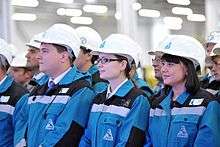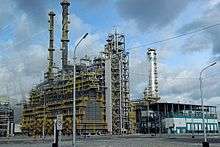Sibur
SIBUR (PJSC SIBUR Holding) is a Russian gas processing and petrochemicals company headquartered in Moscow. SIBUR operates 26 production sites located all over Russia, had over 1,400 major customers engaged in the energy, automotive, construction, fast-moving consumer goods (FMCG), chemical and other industries in approximately 70 countries worldwide and employed over 28,000 personnel. In 2015, its revenue was RR 380 bln and EBITDA RR 136 bln.
History
The company was founded by an act passed by the Government of the Russian Federation in March 1995, with 38% of its shares state owned. The remaining 62% of the company was made public.
Towards the end of 1998, SIBUR started its transformation into a vertically integrated petrochemical holding with a full production chain from the processing of raw materials through to the manufacture of finished goods. SIBUR subsequently built up assets by buying stakes in petrochemical companies all over Russia. As a result, some 60 companies soon belonged to the company.
By 2001, Gazprom had acquired control of SIBUR with a 51% stake. Alexander Dyukov was appointed president in February 2003 and oversaw significant reform with the introduction of a long-term growth strategy.
By September, the stock was divided between Gazprom (25%) and Gazprombank (75%). Dyukov was succeeded by Dmitry Konov as SIBUR’s new president towards the end of 2006.
2005: transfer of assets from AK Sibur to SIBUR holding
In July 2005, SIBUR founded AKS Holding (whose legal successor is today's SIBUR) to clean up the holding's debts of RUB 60 bn, with most of this amount due to the parent company. The balance sheet of AKS Holding received the shares of 26 petrochemical businesses held by SIBUR. In December 2005, AKS Holding was renamed SIBUR Holding.
Gazprom decided that the petrochemical business was a non-core asset in 2008, and SIBUR shares were sold to Gazfund in exchange for its energy assets. Both Gazprombank and Gazfund also withdrew from the Gazprom group. In December 2010 Gazprombank began a phased sale of SIBUR to a private shareholder, Leonid Mikhelson.
By the autumn of 2011, 100% of SIBUR came to be owned by the company SIBUR Limited, which since 2013 is 82.5% owned by Leonid Mikhelson and Gennady Timchenko. The owners of the remaining 17.5% include SIBUR's former and current top management.
In 2014 a firm wholly owned by Kirill Shamalov, deputy chairman of the Management Board of SIBUR, has acquired 17% in SIBUR Holding, previously beneficially owned by entities under control of Gennady Timchenko. Following this transaction, Kirill Shamalov’s ownership in SIBUR increased to 21.3%.
Following completion of this transaction, the ownership structure of SIBUR as at 5 September 2014 is as follows:
- Leonid Mikhelson – 50.2%
- Kirill Shamalov – 21.3%
- Gennady Timchenko – 15.3%
- Current and former managers of SIBUR Holding (excluding Kirill Shamalov) – 13.2%
Business segments
Feedstock and energy
The Group’s feedstock and energy segment comprises:
- gathering and processing of associated petroleum gas (APG) that SIBUR purchases from major Russian oil companies,
- transportation, fractionation and other processing of natural gas liquids (NGLs) that SIBUR produces internally or purchases from major Russian oil and gas companies, and
- marketing and sales of energy products, such as natural gas, liquefied petroleum gases (LPG), naphtha, raw NGL, methyl tertiary butyl ether (MTBE) and other fuels and fuel additives.
SIBUR’s feedstock processing infrastructure includes seven out of the nine existing GPPs in Western Siberia, five compressor stations and three GFUs. As of 31 December 2015, SIBUR had APG processing capacity of 24 billion cubic metres per annum and raw NGL fractionation capacity of 8 million tonnes per annum. SIBUR sells energy products on the Russian and international markets and uses some of them as feedstock for its petrochemicals segment, which processes them into various petrochemicals, including basic polymers, synthetic rubbers, plastics and products of organic synthesis, as well as intermediates and other chemicals.
Feedstock and energy facilities
- OAO SiburTyumenGaz (100%)
- OOO Zapsibtransgaz (100%)
- OOO Yuzhno-Priobskiy GPP (50%) (JV with Gazprom Neft Group)
Petrochemicals

In its petrochemicals business, the Group operates three steam cracker facilities, one PDH unit, two basic polymers production plants, manufacturing low-density polyethylene (LDPE) and polypropylene (PP), three synthetic rubbers production plants, manufacturing commodity and specialty rubbers as well as thermoplastic elastomers, and 13 production plants manufacturing plastics and organic synthesis products, including polyethylene terephthalate, glycols, alcohols, BOPP-films, expandable polystyrene, acrylates as well as a wide range of intermediate chemicals. As of 31 December 2015, the Group’s basic polymers production capacity was 1 mln tonnes [1] tonnes per annum, synthetic rubbers production capacity was 562 thousand tonnes per annum and plastics and products of organic synthesis production capacity was more than 1 mln tonnes per annum.
In 2016 SIBUR joined its Tobolsk facilities in a new Division named Tobolsk Industrial Site
Tobolsk industrial site facilities
- OOO SIBUR Tobolsk (100%) (former Tobolsk-Neftekhim)
- OOO Tobolsk - Polymer (100%)
- OOO Tobolsk HPP (100%)
- OOO ZapSibNeftekhim (100%) (under construction)
Basic polymers facilities
- OOO Tomskneftekhim (100%)
- OOO NPP Neftekhimia (50%) (JV with Gazprom Neft Group)
- OOO Sibur-Kstovo (100%)
- OOO RusVinyl (50%) (JV with SolVin)

Plastics, elastomers and organic synthesis facilities
- OAO Uralorgsintez (100%)
- OAO Sibur-Neftekhim (100%)
- ZAO Sibur-Khimprom (100%)
- OAO Polief (82.5%)
- OAO Sibur-PETF (100%)
- OOO SIBUR GEOSINT (100%)
- OOO BIAXPLEN (100%)
- OAO Voronezhsintezkauchuk (100%)
- Sibur-Sinopec Rubber Holding Company Limited (74.99%) (JV with SINOPEC*)
– OAO Krasnoyarsk Synthetic Rubbers Plant (100%)
- OOO Togliattikauchuk (100%)
- ZAO Togliattisintez (100%)
- Reliance Sibur Elastomers Private Limited (25.10%) (JV with Reliance Industries Limited)[2]
Tyre business
At the end of December 2011, SIBUR fully exited SIBUR-Russian Tyres, having sold a 75% stake to the company's management, and the remaining stake to the partners of Vadim Gurinov, its CEO.[3]
Mineral fertiliser business
At the end of December 2011, SIBUR sold its mineral fertiliser assets to URALCHEM (Mineral Fertilisers, Perm) and Siberian Business Union (Kemerovo Azot and Angarsk Azotno-Tukovy Zavod).[4]
Acquisitions
- In 2009, SIBUR acquired 50% stake in Russian BOPP-films producer BIAXPLEN. In March 2012, SIBUR gained control of the BIAXPLEN group of companies by increasing its stake from 50% to 100%. At the time of the acquisition, production facilities of the BIAXPLEN group comprised three plants located in the Nizhny Novgorod, Kursk and Moscow regions with a total capacity of 78,000 metric tons of commodity films per annum.
- In 2011, SIBUR acquired JSC Acrylate - the only CIS-based producer of acrylic acid and its estersfrom ATEK Group.
Joint ventures
- In June 2007, SIBUR established OOO RusVinyl, a 50/50 joint venture with SolVin Holding Nederland B.V.. This joint venture was established to construct a PVC plant with a capacity of 330 ktpa for PVC and 225 ktpa for caustic soda.
- In February 2012, SIBUR entered into a joint venture arrangement with Reliance Industries Limited, pursuant to which a JV Reliance Sibur Elastomers Private Limited was set up, in which SIBUR owns a 25.1% stake. This joint venture was established for the development of butyl rubber production facility in India with capacity of 120 ktpa. It would start production by 2015.[2]
- In October 2012, SIBUR signed an agreement with Solvay SA (initially negotiations were held with Rhodia (France) prior to its acquisition by Solvay) to establish RusPav, a 50/50% joint venture. The JV was established for the development of surfactants and oilfield process chemicals production site in Dzerzhinsk, the Nizhny Novgorod region.
- In August 2013, SIBUR and China Petroleum and Chemical Corporation (Sinopec Corp.) entered into a joint venture developed on the site of the Krasnoyarsk Synthetic Rubber Plant (KZSK). Sinopec purchased 25% + 1 share of KZSK.
External links
References
- ↑ Including 100% of processing capacity of NPP Neftekhimia, SIBUR’s JV with the Gazprom Neft Group
- 1 2 "India's butyl rubber import my end once Russian JV starts in 2015". IANS. news.biharprabha.com. Retrieved 24 April 2014.
- ↑ "Russia's Sibur divests tyre business". ICIS News.
- ↑ "Sibur to Sell Fertilizer Assets to Siberian Business Union". Bloomberg.